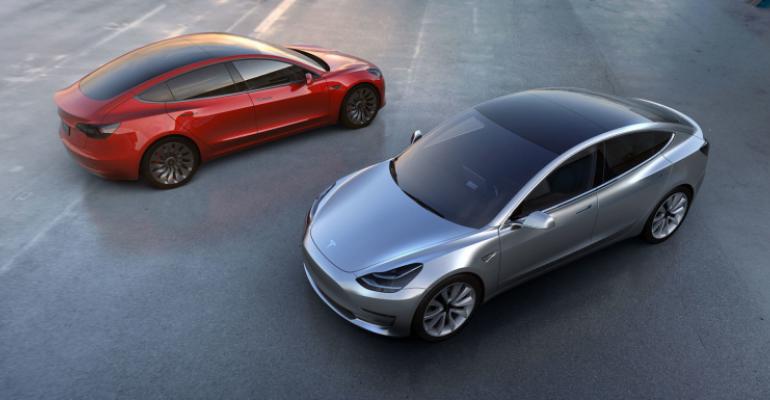Neither Hyundai nor Kia appear to be overly concerned – yet – with electric-vehicle maker Tesla’s plan to launch sales of its upcoming lower-cost compact Model 3 in Korea.
An unnamed Hyundai Motor Group official tells Korean news media sales could launch next year, but Tesla Chairman and CEO Elon Musk is on record as saying the Model 3 won’t be sold in overseas markets until sometime in 2018. He confirms Korea is one of them.
A search of Tesla’s website suggests the automaker could become Korea’s top seller of EVs almost overnight, because the market is minuscule. According to the Korean Automobile Manufacturers Assn., 1,183 all-electric vehicles were sold in the country in 2014, the most recent year for which statistics are available.
Tesla is not just planning to export the Model 3 to Korea though local distributors. The company intends to set up its own sales and service infrastructure to support it, including a brand-dedicated national recharging network.
Tesla has registered its Korean company address in the upscale Seoul suburb of Gangnam, where it is expected to open its first store. The EV maker currently is advertising six key executive and technical job openings in Korea.
The company, Tesla Korea, was registered in November 2015. Listed officers are Todd Maron, Tesla’s general counsel, and Susan Repo, a director at Tesla Financial Services.
Waiting List for Model 3 Vastly Outweighs Output
The most recent 10Q report filed by Tesla with the Securities and Exchange Commission in May bears out the popularity of the brand. The report states that in just one week the automaker logged 325,000 reservations for the new, lower-cost Model 3 sedan. Many analysts believe the number of reservations now exceeds 400,000.
The report says Tesla has delivered more than 122,000 vehicles since the 2012 production launch of the Model S through March 31. In the first three months of 2016, Tesla produced 15,510 units, including 2,650 copies of the new Model X CUV. The report states production of the SUV was challenged by supplier parts shortages.
The company plans to deliver 50,000 vehicles in the second half of 2016, selling 80,000 to 90,000 Model S sedan and Model X vehicles for the full year.
With respect to overseas sales, the 10Q report acknowledges Tesla “has relatively limited experience in international markets and thus may face difficulties meeting our future expansion plans.
“If we experience unexpected difficulties or delays in finding and opening desirable locations for stores and service centers, we may not be able to meet our delivery plans.”
In Korea, building a store in tony Gangnam is an expensive undertaking. Some local analysts believe Tesla will do so by participating with partners. They expect the automaker to take the same approach to developing its own recharging grid.
Despite the uncertainties and hedging, Tesla acknowledges in its 10Q statement, Korean automakers would disregard the Model 3’s impact on their home market at their own risk.
If it is priced at $35,000-$40,000 and qualifies for federal and local government subsidies, the EV might retail in Korea for little more than $20,000. The current federal EV subsidy is about $13,000, while local incentives vary by community.
Charging Network, Chinese Imports Could Jolt Domestic Automakers
The planned nationwide charging network could be Tesla’s trump card in Korea. As in other countries with underdeveloped charging capabilities, EV sales are small. The KMMA figures show the country’s best-selling all-electric model in 2014 was the Kia Soul EV with just 414 deliveries.
Four of Korea’s five best-selling cars that year were locally produced: Renault Samsung’s SM3 ZE ranked second with 309 deliveries, followed by Kia’s Ray minicar with 202. The imported BMW i3 was fourth with 170 units and GM Korea’s Spark EV was fifth with 70.
Clouding the picture for analysts, and possibly a game changer, are reports Tesla is holding discussions in China with potential partners who are interested in building an EV production facility.
Musk has said it would be close to three years before a plant in China was possible.
It would be easy for Tesla to export China-built EVs to Korea, although cars are excluded from the free-trade agreement between the two countries.
The cost of a Chinese JV plant would be substantial, and it is not clear whether Tesla is the right vehicle for that market, where it would have to compete with inexpensive locally built EVs.
The automaker, which has 20 stores in China, 400 of its rapid Superchargers in 100 locations and 1,300 Destination Chargers at commercial venues such as hotels, shopping malls, restaurants and resorts, missed its Chinese sales targets last year.
While the Tesla Model 3 would be a threat to Hyundai and Kia in the lower end of the EV market, the Model S and Model X also could find buyers in Korea, where big-ticket cars have no difficulty finding aficionados.





